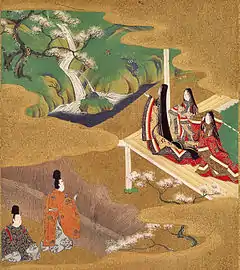亞瑟·偉利
亞瑟·偉利,CH、CBE(英語:,日语:,1889年8月19日—1966年6月27日),英籍東方學學者及漢學家。
| 亞瑟·偉利 Arthur Waley | |||||||||
|---|---|---|---|---|---|---|---|---|---|
| 出生 | 1889年8月19日 | ||||||||
| 逝世 | 1966年6月27日(76歲) | ||||||||
| 墓地 | 海格特公墓 | ||||||||
| 母校 | 剑桥大学 (未毕业) | ||||||||
| 知名于 | 中国与日本文学翻译 | ||||||||
| 汉语名称 | |||||||||
| 简化字 | |||||||||
| |||||||||
| 日语名称 | |||||||||
| |||||||||
正如一近期的評論所言,“在中日二國的古文,與英語系大眾讀者間,偉雷是一位偉大的轉介者;他在20世紀的上半段時期扮演了東方與西方間的大使。他的中文及日文皆是自學成才,而且不論是流暢性或學識,都達到了卓越的程度。這是一個難能可貴的成就,也如他自己後來所注,或許這只能發生在那個時期,也無法再能做到了。” [1]
他对提高认识和学术关注英语世界做出极大贡献,使得再次出版的经典作品有了更广泛的阅读群体。
生平
韋利出生於英格蘭肯特郡皇家唐橋井。原名為 阿瑟·大偉·施洛斯(Arthur David Schloss),是經濟學家大衛·弗雷德里克·施洛斯(David Frederick Schloss)的兒子。正當在一次大戰時,大多擁有德國姓名的人們改取更具英式的姓名的時期,生為猶太後裔的偉雷在1914年時,把他的姓氏變更為他祖母的娘家姓氏,偉雷。曾在拉格比公學就讀,後來在1907年進入剑桥大学国王学院,但在1910年,由于眼疾未能完成学业。
在1913年,偉雷被大英博物館任命為東方印刷品和手稿的保存助手。在這段期間內,他自學了中文和日文,部份的原因是為了協助保存博物館的畫作目錄。他於1929年離開,並全心竹的投入他對文學及文化的喜愛,並同時持續的為倫敦東方和非洲研究學院講學。
偉雷居住於布卢姆茨伯里,並有著不少朋友來自“布卢姆茨伯里社團”。許多他遇見的團員在當時都仍是在校生。他是其中一位認出Ronald Firbank是位優秀的作者,並與 Osbert Sitwell 及其他人為 Firbank 的第一部選輯寫了導論。
著名的美國詩人艾兹拉·庞德 協助了在偉雷將他的第一篇譯作出版在《小評論》上,但是,他對偉雷作品的評論卻是好壞參半的。他在1917年7月12日寫給《小评论》的編輯玛格丽特·安德森的信中是這麼說的:“最少試著留下偉雷對白居易的譯作,其中有些詩是相當壯麗的。幾乎所有的譯作都有著他笨拙的英文及有缺陷的節奏.....我實是應該試著讓他留下最佳的,而刪除這些拙劣的部份。(他倔強的和頭驢,或“學者”一樣)。然而,偉雷在他的道德經譯作The Way and its Power, 解譯說,他是小心翼翼地,視將文本中的意義清楚的傳達給西方的讀者,更勝於譯作本身的文字風格。
授勳
偉雷在1945年被授勳為剑桥大学国王学院榮譽學者,在1952年获颁大英帝国司令勋章獎項,1953年获颁女王金质诗歌奖章,及在1956年獲颁名譽勳位。
 · 名誉勋位, 1956.
· 名誉勋位, 1956._Ribbon.png.webp) · 大英帝国司令勋章, 1952.
· 大英帝国司令勋章, 1952.
精选作品
原创翻译
| 出版品 | 原作 |
|---|---|
| A Hundred and Seventy Chinese Poems, 1918 | |
| More Translations from the Chinese (Alfred A. Knopf, New York, 1919). | 包含:莺莺传-元稹、李娃传-白行简 |
| Japanese Poetry: The Uta, 1919 | 节选自: 万葉集 (彌生時代,前)、古今集 (飛鳥時代、平安時代) |
| The Nō Plays of Japan, 1921 | 色々 |
| The Temple and Other Poems, 1923 | |
| The Tale of Genji, by Lady Murasaki, 1925-1933 | 源氏物語、紫式部 (平安時代, ?1006-?1021) |
| The Pillow Book of Sei Shōnagon, 1928 | 枕草子、清少纳言 (平安時代、?990-1002) |
| The Way and its Power: A Study of the Tao Te Ching and its Place in Chinese Thought, 1934. A commentary on Tao te ching, attributed to Laozi, and full translation. | 道德經﹣老子 |
| The Book of Songs, 1937 | 詩經﹣孔子 |
| The Analects of Confucius, 1938 | 論語﹣孔子 |
| Three Ways of Thought in Ancient China, 1939 | |
| Translations from the Chinese, a compilation, 1941 | |
| Monkey, 1942, highly abridged translation of Wu Cheng'en's Journey to the West | 西遊記﹣吴承恩 |
| Chinese Poems, 1946 | |
| The Nine Songs: A Study of Shamanism in Ancient China, Yuan Qu, 1955 | 九歌 - 屈原 |
| Yuan Mei: Eighteenth Century Chinese Poet, 1956 | 袁枚詩選 |
| Ballads and Stories from Tun-Huang, 1960 |
原创作品
- Introduction to the Study of Chinese Painting, 1923
- The Life and Times of Po Chü-I (白居易), 1949
- The Poetry and Career of Li Po (李白), 1950 (with some original translations)
- The Real Tripitaka and Other Pieces (三藏), 1952 (with some original and previously published translations)
- The Opium War through Chinese Eyes, 1958
- The Secret History of the Mongols, 1963 (with original translations)
参考来源
- E. Bruce Brooks, "Arthur Waley" (页面存档备份,存于) Warring States Project, University of Massachusetts.
參考文獻
- Jonathan Spence. "Arthur Waley," in, Chinese Roundabout (New York: Norton, 1992 ISBN 0393033554), pp. 329–336. (页面存档备份,存于)
- "Arthur Waley, 76, Orientalist, Dead; Translator of Chinese and Japanese Literature," (页面存档备份,存于) New York Times. 28 June 1966.
- Gruchy, John Walter de. (2003). Orienting Arthur Waley: Japonism, Orientalism, and the Creation of Japanese Literature in English. Honolulu: University of Hawaii Press. ISBN 0-8248-2567-5.
- Waley, Alison. (1982). A Half of Two Lives. London: George Weidenfeld & Nicolson. (Reprinted in 1983 by McGraw-Hill.)
- Morris, Ivan I. (1970). Madly Singing in the Mountains: An Appreciation and Anthology of Arthur Waley. London: Allen & Unwin.
- Jones, Francis A. (1968). A Bibliography of Arthur Waley. New Brunswick, New Jersey: Rutgers University Press.
外部链接
- E. Bruce Brooks, "Arthur Waley" (页面存档备份,存于) Warring States Project, University of Massachusetts.
- Waley's translation of The Way and its Power
- Arthur Waley的作品 - 古騰堡計劃

